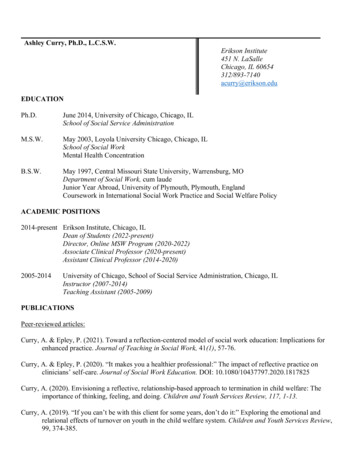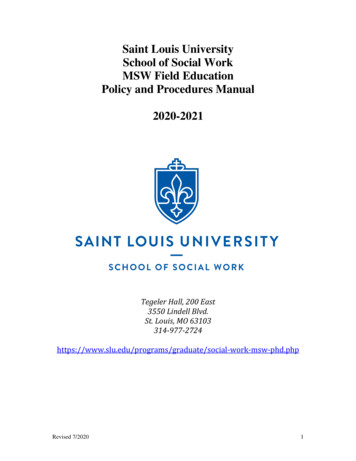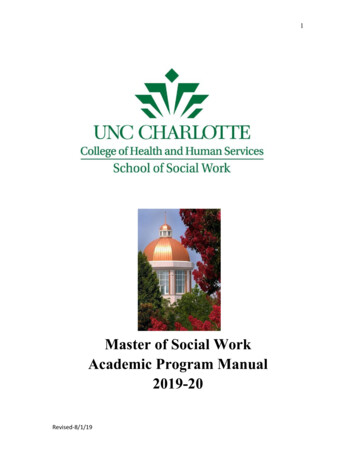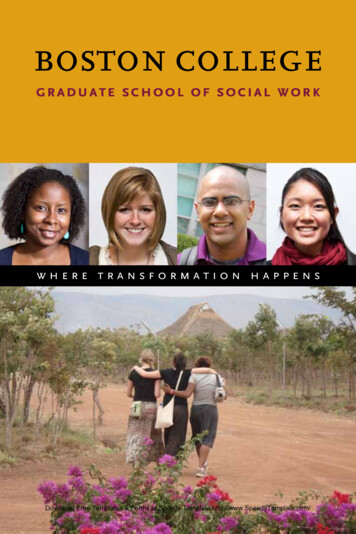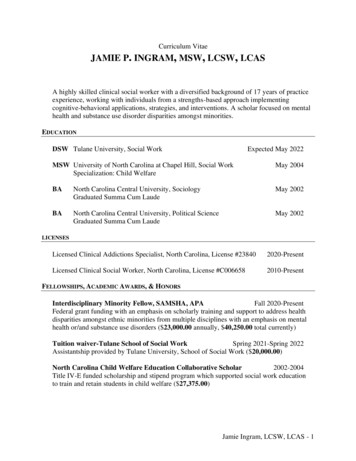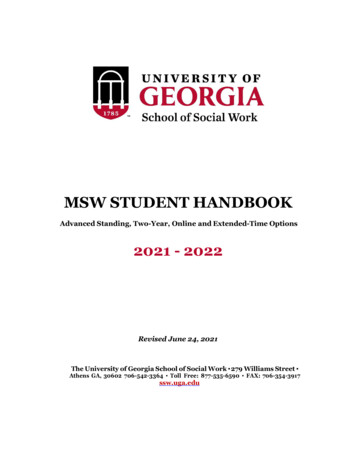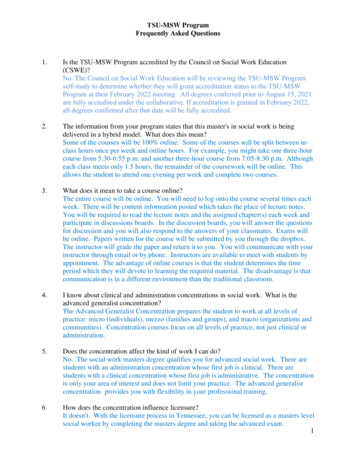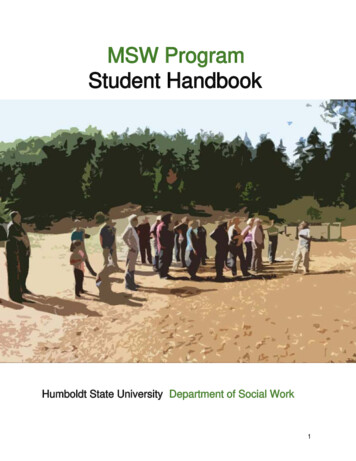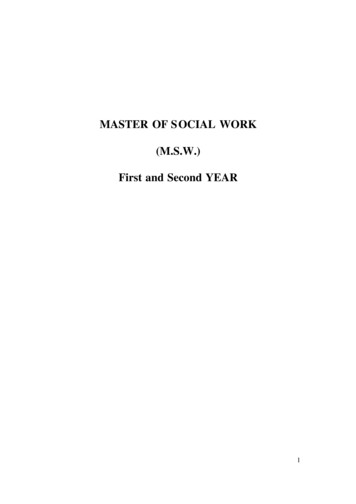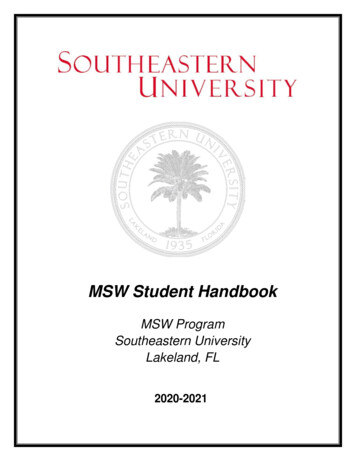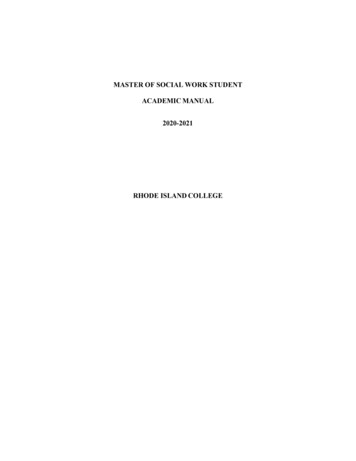
Transcription
MASTER OF SOCIAL WORK STUDENTACADEMIC MANUAL2020-2021RHODE ISLAND COLLEGE
PrefaceThis manual contains the policies and procedures related to the MSW Program. We encourageyou to read through it, use it often, and depend on it for a thorough understanding of theprogram’s rules. When you have questions, let us know. We wish you great success as youpursue the MSW program. We welcome you and look forward to greeting you as an MSWcolleague at the end of your educational journey.The Master of Social Work program within the School of Social Work was fully accredited bythe Council on Social Work Education in 2018 and will be accredited until 2026. It is a programwith a history of concern for social justice and a strong generalist perspective. Accreditationmeans that our program is fully recognized by its peer schools and the Council. The program’shistory means that you are entering a program that believes people can learn, grow, and change.It recognizes that people bring strengths and assets to their lives and they bring challenges aswell. Some of those challenges may come from their environment and the efforts of social workmust be directed both at assisting individuals with their personal challenges and removing thebarriers in their environment that keep them from realizing their potential.
IntroductionMission and Goals of the MSW ProgramThe School of Social Work at Rhode Island College prepares students for social work practice indiverse communities throughout Rhode Island and southern New England, with individuals,families, groups, organizations, and communities. We work to eliminate social injustice andeconomic inequality in an effort to realize a just and equitable society. We seek to create, analyzeand evaluate knowledge and to instill in students a deep understanding of the people andcommunities they work with and the structural influences affecting their daily lives.Vision Statement:The School of Social Work at Rhode Island College is widely recognized for:§§§§§§§Student-centered learning environmentsDiverse and inclusive pedagogyExcellence in social work educationAdvocacy with and for oppressed and vulnerable populationsCritical thinking and purposeful action to address social problemsQuality of training for social work practitioners, andContributions to knowledge and skill development.MSW Program GoalsGraduates of the MSW program will.§Engage in advanced-level social work practice that is informed by the best availableevidence§Apply social work ethical principles to guide their professional practice§Apply knowledge of human behavior and the social environment to work withindividuals, groups, families, organizations, and communities.§Understand the impacts of culture, oppression, and human diversity in a multi-culturalsociety.§Advance social and economic well-being and deliver effective social work servicesthrough policy practice.§Identify themselves as professional social workers and act accordingly.
Curriculum Structure of the MSW ProgramTo earn an MSW graduate degree, students must complete 62 credit hours of classroom and fieldwork, which can be completed in two years as a full-time student or four years as a part-timestudent (can be extended to 6 years). Students with a BSW degree from a CSWE-accreditedundergraduate program who are granted Advanced Standing must complete 33 credit hours ofclassroom and field work at the advanced level. Advanced standing students complete theprogram in one year, if full time, and two years if part time (can be extended to four years).The curriculum is divided into foundation and advanced curriculum content. In the fall semesterof the student’s foundation year, full-time students develop a plan of study, working with theiradvisor, that indicates their concentration – clinical or macro. Advanced standing studentsdevelop a plan of study during their MSW orientation. The plan of study outlines the requiredand elective classes that students intend to take.Generalist Foundation CurriculumThe MSW program at the School of Social Work at Rhode Island College uses a generalistsocial work practice framework as its foundation. The generalist perspective stresses that thesocial worker focuses on social problems and human needs. The generalist approach recognizesthe connection between individual problems and challenges and public issues, between theindividual's well-being and the environmental conditions of their lives, and between personaland social change. The social worker should recognize that an individual client does not need tochange simply because they have identified a problem and that the responsibility for socialchange is not relieved just by developing legitimate personal change objectives with a client. Thegeneralist approach stresses that intervention should occur at the level of the system or systemsthat have caused or contributed to the problems. Social workers must be prepared to intervenewith individuals, families, groups, organizations, and communities. The social worker must beprepared to use a variety of theories, skills and methods for client engagement, assessment,intervention, and evaluation of the work. The curriculum of the MSW program introducesstudents to an understanding of basic knowledge, such as systems theory, and skills in problemsolving common to both macro (societal, community, organizational) and micro (individual,family, small group) levels of practice.Thus, the mission of the School of Social Work and the perspective of generalist practiceintersect as reflected in the following definition of social work practice: the process ofresponding to social need to promote the achievement of the fullest human potential and toprevent or alleviate problems and disadvantage. Social work practice identifies the source(s) ofthe difficulty or potential for enhancement, develops professional helping relationships directedtowards change, and builds upon the strengths and resources of those in need to intervene inways that are consistent with social work values and ethics. The goals of helping are to moreequitably distribute resources, empower those who are oppressed, and increase individual andsocietal well-being. Generalist foundation content includes social work values and ethics,diversity and oppression, advancement of social and economic justice, theories of humanbehavior, social work practice, research, social policy, and field education.
During the foundation year, all students participate in the following courses:§Human Behavior, Diversity, and Oppression: this sequence provides students with anunderstanding of human development and growth in relation to structural andenvironmental factors that may enhance or impede functioning. It focuses on diversity anddifference and calls attention to experiences of oppression and injustice.§Social Work Research and Evaluation and Data Analysis: these courses introduce studentsto the role and value of research in social work, the development and building of evidence toinform social work practice, the ability to evaluate practice, and the initial skills to doresearch in social work arenas. Students complete a research plan (quantitative orqualitative) and in the second course, explore statistical, and qualitative, data analysis.§Generalist Foundation and Skills: Policy and Organizing I and II; The first social policycourse familiarizes students with the history of social welfare and social work, and provides acritical understanding of social policy, major social issues confronting society, and the roleof the social worker. In the second course, students plan for and participate in advocacy andorganizing efforts to develop skill in addressing public policy issues.§Generalist Foundation and Skills: Direct Practice I and II: The social work practice sequenceestablishes competencies in the problem-solving approach of generalist practice. It stimulatesawareness of self as a professional social worker and teaches skills for working withindividuals, families, and groups. Students learn skills and practice them.§Field education offers an intensive social work practice experience in which students haveopportunities for supervised direct service to client systems, as well as for involvement inadvocacy and/or organizing. (Rhode Island College carries professional liability insurancethat covers all students during their tenure in the program, including work in the field.However, we recommend but do not require, that you consider obtaining your ownindividual liability insurance if you are concerned about specific protection.)Foundation CoursesStudents are required to take the following courses in the foundation year(s). Full-time studentscomplete these courses in one year. Part-time students complete the program in two years.Human Behavior, Diversity, and Oppression SequenceCourse #TitleSW 520SW 522Human Behavior, Diversity and Oppression IHuman Behavior, Diversity and Oppression IICredits33
Social Work Research and EvaluationCourse #SWRK541SWRK542TitleSocial Work Research and Evaluation ISocial Work Research and Evaluation IISocial Welfare Policy SequenceCourse #SW 530SW 531SW 533TitleTitleCredits33CreditsGeneralist Foundation and Skills: DirectPractice IGeneralist Foundation and Skills: DirectPractice IISocial Work Seminar and Field PlacementCourse #TitleSW 500SW 50132Generalist Foundation and Skills: Policy andOrganizing IGeneralist Foundation and Skills: Policy andOrganizing IISocial Work Practice SequenceCourse #SW 532CreditsField Experience and Seminar IField Experience and Seminar II33Credits33Course Waiver Policy for Foundation Year Human Behavior and Research coursesStudents who have received an A or A- in BSW program courses, or equivalent undergraduateor graduate courses, may request to take waiver examinations for Human Behavior, Diversityand Oppression I and II (SW 520 & 522) and Social Work Research and Evaluation and DataAnalysis (SW 541 & 542). Students should contact the Department Chair for approval to sit for,and subsequent administration of, each waiver examination.
Advanced Curriculum – Areas of ConcentrationThere are two areas of concentration: Clinical and Macro (Policy and Administration).Clinical Social Work PracticeThe advanced clinical curriculum of the MSW program consists of two clinical practicecourses (SWRK 602 and SWRK 603) and a required assessment and differential diagnosiscourse (SW 636). All students enroll in the professional development seminar and a clinicalevaluation and case consultation course. Field placements must be related directly to theclinical concentration. Students also choose three free electives. Current electives in the clinicalconcentration include a wide range of courses that focus on a varied number of issues. Pleaserefer to our catalog to get the most updated list.
The focus of these courses is on developing and strengthening clinical social work skills, whichinclude engagement, assessment, planning, intervention, and evaluation with individuals,couples, families or groups. Life transitions, populations at risk, and cognitive, affective andbehavioral issues are examined from a person-in-situation perspective by using current theoryand research. Each of the courses includes content on substance use and abuse, mood disorders,and anxiety disorders.Macro (Policy and Administration) Social Work PracticeThe macro practice curriculum consists of two required courses on macro practice and amandated political economy course. Students enroll in SW 628: Macro Practice I: Leadership &Change and SW629: Macro Practice II: Managing People and Programs. Students also take arequired elective SWRK 621: Social work and the Political Economy. All students enroll in theprofessional development seminar and a macro research course. Field placements must berelated directly to the macro concentration.The courses focus on developing knowledge and skills for management practice in organizationsand for policy practice in communities using current theory and research. In the fall, studentsexamine leadership styles, explore their own, and then identify the effect of leadership on largesystem change efforts. Students learn about organizational practice through understandinghuman resources – hiring, supporting and evaluating staff – and a manager’s role in thoseprocesses. Students design a program; they develop a proposal for funding that includes abudget for program delivery and identify potential funders for their projects. In the fall course,students assess an organization or community’s readiness for change and in the second course,they develop a plan for bringing about change that improves or increases services to clients orclient groups. The political economy course provides a contextual framework for organizationaland governmental policy analysis and builds student skills in advocacy andpersuasion. The curriculum is intended to advance human rights and social and economic justicein organizational and policy practice settings. Macro students also take three free electives.Research CoursesAll students are required to complete a two-semester research course in their advanced year. Theclinical research course explores clinical measures and asks students to prepare a clinicalassessment and evaluation of a client’s work and to explore varied instruments for measuringclinical progress. The macro research course focuses on needs assessment and programevaluation. In the fall, macro students develop two plans, one to create an asset map of aphysical or social community and the other to evaluate the effectiveness of an existing program.In the spring, each student implements one of these plans. These courses meet twice a month,sharing a day and time with field seminar.Professional Development SeminarAll students enroll in this four-credit course that explores advanced policy, ethics and diversitycontent from the perspective of individual student interest. Various faculty members will presentmaterial related to each of the topics. Students will identify an area of interest and completeassignments related specifically to their area of interest.
Field Education and SeminarStudents enroll in field for a 20-hour/week internship at the advanced level. The field seminarmeets every other week, on opposite weeks from sessions for advanced research. Field seminarexplores many issues regarding practice and internship, use of supervision, and professional useof self.Elective CoursesStudents in both concentrations have three free electives from which they can choose.Included are several 500- and 600-level courses. Students should check schedules prior toregistration to determine the specific courses offered in the upcoming semester.Credit for Academic or Life ExperienceThe MSW program does not permit academic credit for life experience or previous workexperience.Full-Time ProgramStudents must complete two years of the required courses and elected courses, along with fieldeducation. To be considered a full time student, one must be enrolled in courses totaling ninecredit hours. To complete the current 62-credit hour curriculum within a two-year period,students will need to plan on taking at least one summer or early spring course.Part-time ProgramThe part-time program can be completed in four years (can take up to 6 years). Students enroll inHuman Behavior, Diversity, and Oppression and in the research sequence in their first year in theprogram. During their second year, they take the policy and direct practice foundation coursesand the foundation year field education seminar and placement. Students may take up to twoadditional years to complete their advanced or concentration year. In the third year werecommend that students enroll in the advanced practice courses and advanced field seminar andplacement. Finally, in the fourth-year students finish their required courses and/or their electives.By taking electives during summer sessions or in early spring semesters, part- time students cancomplete the program in three and one-half years.Advanced Standing ProgramThe Advanced Standing program is available to students who have earned a BSW degree from aprogram accredited by the Council on Social Work Education. The program must have beenaccredited at the awarding of the student’s degree. Students begin the program at the start of theadvanced year, although the MSW program may require students to enroll in and successfullycomplete summer bridge workshops before students begin the program. Students must complete33 credits in field and academic courses to meet graduation requirements.
Advanced Year Courses, Credits, and Semester OfferedFull-Time ProgramClinical ConcentrationThird Semester (Clinical concentration full-time students)SWRK600 Field Education and Seminar IIISWRK602 Clinical Social Work Practice ISWRK636 Differential DiagnosisSWRK644 Clinical Evaluation and Case Consultation ITwo Free SWRK601 Field Education and Seminar IVSWRK603 Clinical Social Work Practice IISWRK609 Advanced Professional DevelopmentSWRK646 Clinical Evaluation and Case Consultation IIOne free elective4341.53SpringSpringSpringSpringSpringTotal credit hours62Fourth Semester (Clinical concentration, full time students)Full Time ProgramMacro ConcentrationThird Semester (Macro concentration, full-time students)SWRK600 Field Education and Seminar IIISWRK628 Macro Practice I: Leadership & ChangeSWRK621 Social Work & the Political EconomySWRK645 Needs Assessment & Program Evaluation ITwo Free electives4331.56FallFallFallFallSummer/FallSWRK601 Field Education and Seminar IVSWRK629 Macro Practice II: Managing People & ProgramsSWRK609 Advanced Professional DevelopmentSWRK647 Needs Assessment & Program Evaluation IIOne free elective4341.53SpringSpringSpringSpringSpringTotal credit hours62Fourth Semester (Macro concentration, full time students)
Advanced Standing ProgramClinical ConcentrationFirst Semester (Clinical concentration, advanced standing students)SWRK600 Field Education and Seminar IIISWRK602 Clinical Social Work Practice ISWRK636 Differential DiagnosisSWRK644 Clinical Evaluation and Case Consultation ITwo Free Second Semester (Clinical concentration, advanced standing students)SWRK601 Field Education and Seminar IVSWRK603 Clinical Social Work Practice IISWRK609 Advanced Professional DevelopmentSWRK646 Clinical Evaluation and Case Consultation IIOne free elective4341.53Total credit hours33SpringSpringSpringSpringSpringAdvanced Standing ProgramMacro ConcentrationFirst Semester (Macro concentration, advanced standing students)SWRK600 Field Education and Seminar IIISWRK628 Macro Practice I: Leadership & ChangeSWRK621 Social Work & the Political EconomySWRK645 Needs Assessment & Program Evaluation ITwo Free electives4331.56FallFallFallFallSummer/FallFourth Semester (Macro concentration, advanced standing students)SWRK601 Field Education and Seminar IVSWRK629 Macro Practice II: Managing People & ProgramsSWRK609 Advanced Professional DevelopmentSWRK647 Needs Assessment & Program Evaluation IIOne free elective4341.53Total credit hours33SpringSpringSpringSpringSpring
Part Time Students, Clinical ConcentrationFifth semester (Clinical concentration, part-time students)SWRK 600 Field education and Seminar IIISWRK 602 Clinical social work practice ISWRK 636 Assessment & Differential DiagnosisSWRK 644 Clinical evaluation and case consultation ing43Summer/SpringFallTwo Free electives6SpringTotal credit hours62Sixth semester (Clinical concentration, part-time students)SWRK 601 Field education and seminar IVSWRK 603 Clinical social work practice IISWRK 646 Clinical evaluation and case consultation IISeventh semester (Clinical concentration, part-time students)SWRK 609 Advanced Professional DevelopmentOne Free electiveEighth semester (Clinical concentration, Part-time students)Part Time Students, Macro (Policy/Administration) ConcentrationFifth Semester (Macro concentration part- time students)SWRK 600 Field education and Seminar IIISWRK 628 Macro Practice I: Leadership and changeSWRK 621 Social work and the political economySWRK 645 Needs assessment and program evaluation I433.01.5FallFallFallFallSixth Semester (Macro concentration part- time students)SWRK 601 Field education and seminar IV4SWRK 629 Macro Practice II: Managing People and Programs 3SWRK 647 Needs assessment and program evaluation II1.5SpringSpringSpringSeventh semester (Macro-concentration, part-time students)SWRK 609 Advanced Professional DevelopmentOne Free elective43Summer/Spring/FallTwo Free electives6SpringTotal credit hours62Eighth Semester (Macro concentration full-time students)
Academic Policies and ProceduresMSW Program PoliciesAcademic AdvisementAll matriculated students are assigned an advisor. The MSW chair works with part-time studentsnot engaged in field education. The advisor for all students who are engaged in field education isthe faculty member who is a field liaison to the agency in which the student is placed.Assignment of advisors for students in field education is for one year and may change in thesecond year.Completing the MSW ProgramSix-year limit. Students must complete all requirements for the MSW degree within six years ofinitial matriculation in the program. While a student may request a leave of absence, time onleave counts toward the six-year time limit to finish the program. At the end of six years, thecandidacy will be terminated, and the Records Office notified by the MSW Chair. An appeal foran extension would require the approval of the academic advisor, MSW Chair and the Dean ofthe School of Social Work.Credits earned at Rhode Island College and elsewhere. Credits seven years or older may notbe counted toward graduation. This applies to both Rhode Island College credits and transfercredits from other institutions. Thus, students must graduate prior to any of these creditsreaching the six-year anniversary.Retention in the MSW program.Any student who does not have a 3.0 GPA at the completion of the foundation year will bedismissed from the MSW program. Any student who has a grade point average (GPA) below 3.0in any semester will be placed on academic probation.Any student who receives a grade below a B- in ANY course must repeat the course.Students dismissed due to a GPA below 3.0 who are reinstated by appeal must repeat allrequired courses in which they have received a grade below B.
Grade of F or U. A student who receives a grade of F or U in a course is automaticallydismissed from the MSW program. Such a dismissal is effective at the end of the appealprocess. However, a student may not continue in classes until the outcome of a grade appeal isdecided. Any grade below a C minus is equivalent to a grade of F.Graduation requirements. To graduate from the MSW Program, a student must have a 3.0 (B)grade point average.Performance in the field. Students who receive a grade of U for a field education course (SW500,501, 600, 601) are immediately dismissed from the MSW program. The faculty of the MSWprogram reserves the right to dismiss from the program students who give evidence (as definedby the College Handbook, the MSW program learning contracts, and/or the NASW Code ofEthics, and the school’s professional code of conduct) of an inability to secure and/or maintain afield placement and carry out field responsibilities at the master’s level. Such dismissal may beappealed to the Academic Standing Committee.Transfer of CreditsTransfer of non-social work credits. A student may transfer a maximum of six non- socialwork but related graduate credits from Rhode Island College or another regionally accreditedinstitution. These credits must have been: (a) taken within five years preceding request fortransfer; (b) a graduate level only course; (c) a course for which a grade of B or better wasreceived; (d) not applied toward receipt of another degree; and, (e) in a related discipline.All credits must meet the 7-year rule to apply to graduation. Transfer credits must be approvedby the Chair and the Dean.Student transfers from other schools of social work. A limited number of students who havesuccessfully completed one or two semesters of work in an accredited MSW program at anotherinstitution may be accepted into the MSW program at Rhode Island College. Transfer studentsmay receive up to 12 transfer credits and must complete at least 50 credits in the RIC MSWProgram as a full- or part-time student. Field placement/seminar credits and hours are nottransferable. All courses taken at another accredited MSW program will be evaluated on acourse by course basis to determine the fit with the program at Rhode Island College. Transfercredits must be approved by the Chair and the Dean.Changes in Student StatusNormally, a full-time student will remain full-time or part-time status throughout the programand may not change from one status to another. However, if a student wishes to be consideredfor a change in status for the remainder of their enrollment, they must submit a written request tothe chair of MSW program to change status. The chair determines whether or not a change instatus will be permitted.Leave of absenceStudents who plan to not register for courses in a given semester must request a leave of absencein order to maintain their status as a matriculated student in the MSW program. Requests for a
leave of absence must be submitted to the chair of the MSW program, giving specific reasonsfor the request with a tentative date for return and plan for completion of the program prior tothe beginning of the requested semester. The maximum request is for a one-year leave.Independent StudyStudents registering for an Independent Study must complete the Independent Study Form foundon the RIC Graduate Studies web page. The form must contain a full description of the subjectto be pursued as well as a description of the outcome and method of evaluation. The form mustbe signed by the dean and the instructor who will supervise the project.Report of IncompleteA report of Incomplete shall be given in place of a grade when the work for the semester has beenpassing but has not been completed because of illness or some other reason that, in the opinionof the instructor, justifies such a report.§§§§§The student must initiate the request prior to the last week of class, unless the instructorhas specified an earlier deadline in the course syllabus, in which case, the instructor’searlier deadline date supersedes the last week of class.Normally the student must initiate a request for an I grade; however, in extremecircumstances, faculty members may assign this grade at their discretion, i.e., withoutdiscussing it with the student.Incompletes are appropriate only if some or most of the work has already been completedand the student is able to complete the remaining requirements with a minimum offaculty supervision by the beginning of the next semester or by its end, depending on thecourse.The student and faculty member will reach an agreement regarding the work that thestudent should complete to obtain a final grade, including the following:§ the contents of the work that needs to be completed;§ the date that the work will be completed: (College policy requires that allIncompletes be completed by the end of the next semester; in the MSW program,this policy applies except where successful completion of one course is aprerequisite to enrollment in the next semester, e.g., enrolling in SW 522 requiressuccessful completion of SW 520.§ the grade that will be assigned if the work is not completed.Contracts for approved Incompletes must be completed and signed by the student, theinstructor and the department chair, and placed in the student's folder prior to assigning agrade of I.Grade GrievancesStudents who believe they have received a grade that does not represent their efforts or resultsand wish to obtain a change of grade must first contact the faculty member within 14 days ofreceiving notice of the grade, to discuss their rationale for requesting a change of grade. Thestudent and faculty member should meet in person for this discussion.
If, after such a meeting, the matter of the grade is unresolved, the student should write a letter tothe MSW program chair requesting re-consideration of the grade. The letter should containrelevant information about the student’s rationale, understanding of the faculty member’sresponse, and an indication of the change the student is requesting.The department chair will schedule a meeting with the student within 14 days to provide anopportunity for discussion. At the chair’s discretion, the faculty member may be invited to themeeting.Following the meeting, the chair will respond to the student in writing within seven days. Theletter will state the chair’s decision. If the student is still dissatisfied they may appeal to the Deanof the School of Social Work.Policy on PlagiarismPlagiarism is using the words of another as your own without quotation marks and/or use ofanother person’s ideas without citation. Use of material from the web or online sources withoutcitation is strictly forbidden. Plagiarism is a serious academic offense and is grounds fordismissal from the MSW program.Academic DishonestyAcademic integrity is the foundation of the academic community. Students who violate Collegerules on academic dishonesty are subject to disciplinary penalties, including the possibility offailure of, or removal from, a course; disciplinary probation; and/or dismissal from the College.Individual schools may have additional standards and policies related to academic honesty.(a) Examples of Academic Dishonesty include (but are not limited to):§Cheating: intentionally using or attempting to use unauthorized materials, information orstudy aids in any academic exercise.§Fabrication: inten
The School of Social Work at Rhode Island College prepares students for social work practice in diverse communities throughout Rhode Island and southern New England, with individuals, families, groups, organizations, and communities. We work to eliminate social injustice and economic inequality in an effort to realize a just and equitable society.
